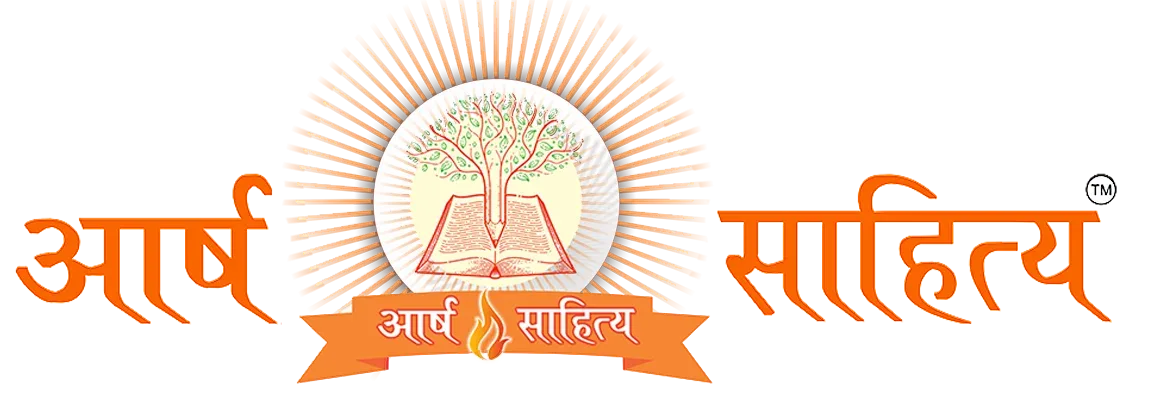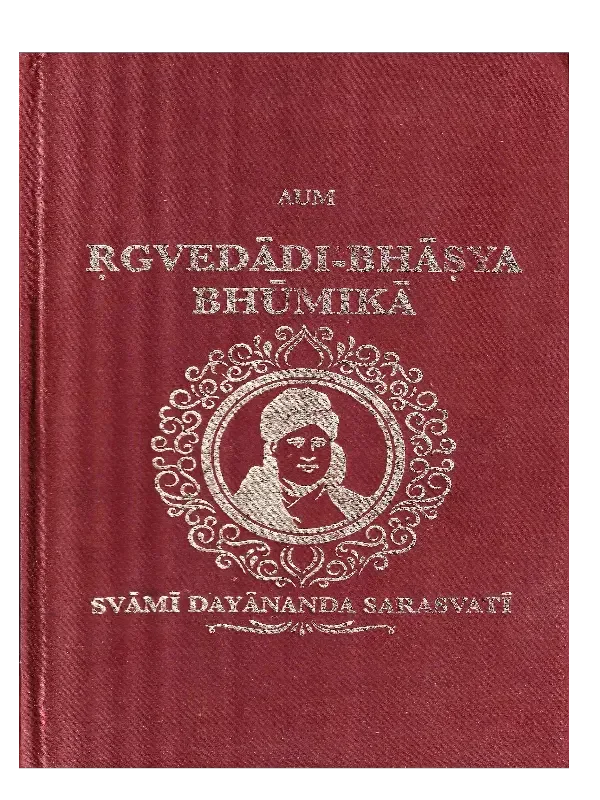






Rigvedadi Bhashya Bhumika English Translation by Parmanand
₹400.00 Original price was: ₹400.00.₹350.00Current price is: ₹350.00.
| AUTHOR: | Parmanand |
| SUBJECT: | Rigvedadi Bhashya Bhumika English Translation by Parmanand |
| CATEGORY: | Vedas |
| PAGES: | 612 |
| EDITION: | 2022 |
| ISBN: | 9788170773145 |
| LANGUAGE: | English |
| BINDING: | Hard Cover |
| WEIGHT: | 1156 g. |
PREFACE
Svāmi Dayananda’s supreme effort in life was to give back to the world the Vedas, the ancient treasure-house of Divine Knowledge. He had taken a long and deep immersion into the perennial stream which quenched his thirst and filled his soul with indescribable solace. He had wandered long and far and wide in dismay before he visioned the light, the light of true and virgin Dharma, as revealed in the Vedas.
He was parivrajaka (a homeless preacher-prince), and the whole humanity was his congregation. He declared that the Vedas were for the lowliest of the low and for the highest of the high. They were the fountain- head from which flowed the nectar of eternal virtue and true knowledge in a never-dying stream to slake the thirst of all the children-the babes and the grown-ups of the Divine Mother. To this fountain-head of peace and purity he invited the misguided mankind and asked them to quench their thirst. This was his mission and for this he lived and died.
As a transparent and pure stream flowing from the silver- white snows gets adulterated in its downward march with muddy streamlets and dirty drains which pollute its purity, so had this eternal stream of Divine Lore become polluted with streamlets of diverse human errors. Dayānanda saw this and saw even much more. There had been commentators and interpreters who had grossly misinterpreted the Veda. It was, therefore, his mission to interpret the Veda in a proper and genuine manner.
Vedic scholarship in India, in the true sense of the term, appears to have ceased with the great work of Yaska-the Nirukta. In fact, among the ancient Vedic commentaries, only the Brahmanas and the Nirukta have come down to us. That there were other works is amply proved by the fact that Yäska mentions several of them. The commentaries of Sayaņa, Skanda, Venkata, Mahidhara, etc., are of recent times. All of them belong to a time later than Yaska’s. According to Dayānanda these commentaries were gross misinterpretations. He based his commentary on the Brahmanas and the Nirukta and rejected all other commentaries. His interpretations are based mainly on the etymological method.
All this explains the importance of Dayananda and his great work, the Rgvedädi-Bhāsya-Bhūmikā, which I am presenting to the English knowing people in the garb of English. I am sure the modern Vedic scholar in India as well as in other countries will be benefited greatly by this work.
The present work has been undertaken with a twofold object: first, to assist the critical scholars as well as the laymen in their studies of the Vedas, particularly its theme and method of interpretation; and secondly, to furnish them with the technical, historical and other cognate matters, relevant to their critical and comparative study.
The introductory part embodies information of general character. It also contains discussions on the problems which hitherto have remained in some respects untouched and untraced by the scholars. Some of the topics which involve endless contro- versies in the modern Vedic scholarship have also been critically examined so as to show the merits and demerits of Dayananda’s method of interpretation of the Veda.
So far the Vedas were read and understood in India and in occident as they were interpreted by Sayana and others or by occidental scholars (i.e., partly in accordance with the so-called traditional method of interpretation offered by Europeans). But the true Indian point of view remained unknown hitherto in India as well as abroad. A sincere effort in this direction has been made here for the first time.
It may be stated here that a chapter on the life and teachings of Svāmi Dayananda, based on all available biographies written by various scholars, including Gopal Rao Hari, the contemporary author of Digvijayārka, Lekh Ram, Devendra Nath Mukerjee, Bawa Chhajju Singh, Lala Lajpat Rai and others, has been appended at the end (pp. 462-88) for the curious readers.
It has been kept brief but I could not resist the temptation of giving the accounts of events (and also adding new facts) as given by lala Lajpat Rai, the devout disciple of Svāmī Dayānanda and the great martyr of India’s liberation. I have also reproduced, in original (pp.476-79), the article which was published in the Christian Intelligencer in 1870, detailing the whole account of the Śāstrārtha (disputation) held in Varanasi in November, 1869 between all the Panditas of Käsi on one side and Dayānanda
alone on the other. The writer of this article was a Christian missionary who himself was present there. This valuable piece of evidence is still preserved in the library of Church Missionary Scoiety in London.
The second part is the English translation of the Rgvedadi- Bhāsya-Bhūmikā from the original Sanskrit which Dayānanda wrote before writing the commentary on the four Vedas. This work is much more voluminous than Sayana’s introduction to the Rg-bhāsya. It covers 400 closely printed pages and contains exhaustive discussions on topics which could not be even imagined by Sayaņa.
Dayananda’s Rgvedādi-Bhāsya-Bhūmikā is a unique work in the field of Vedic scholarship. Almost all Vedic works and other scriptural and philosophical treatises in Sanskrit have been quoted in this work. It contains more than one thousand citations from all spheres of Sanskrit literature, including three hundred verses from the Vedas.
It was not an easy job to translate such a technical work into English. I may add here that Dayānanda has interpreted many verses and citations from the Vedic literature in his own way, quite differently from the generally accepted conceptions and interpretations, and has drawn radically different conclusions.
I have remained faithful to him and have tried to convey to the reader what our author aimed at. I am conscious that my translation is only an humble attempt and is open to criticism at many places, but all the same, it is a very sincere effort to clearly convey the idea of the original to the reader. I have added exhaustive critical and comparative notes on controversial points. Thus it is not merely a faithful translation but a complete bhāsya on the Rgvedadi-Bhāsya-Bhūmikā. I venture to say that I have made efforts to explain the things and not merely to ‘explain
them away.’ In the end it is my pleasant duty to thank all scholars from whose works I have frequently quoted. I am sincerely thankful to my supervisor, Dr. Vishva Bandhu, Honorary Director of the Vishveshvarananda Vedic Research Institute, Hoshiarpur (Punjab) for his encouragement and suggestions.
-Parmanand
| Weight | 1156 g |
|---|---|
| Language | , |








Reviews
There are no reviews yet.